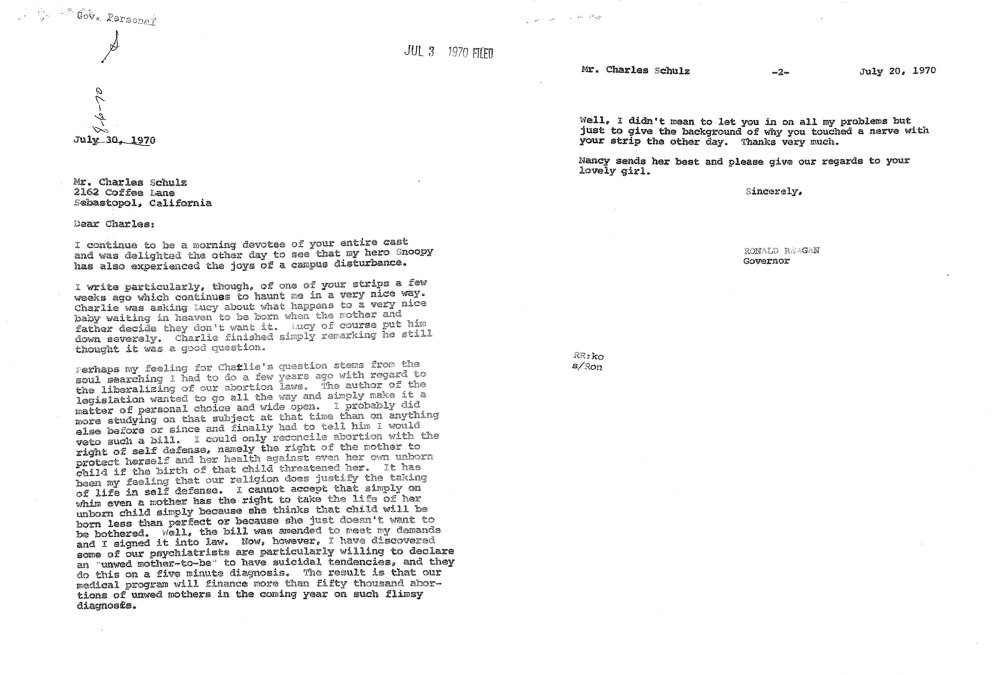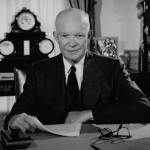
The strip Reagan was commenting on. (It was published on July 20, 1970).


In an effort to show that US President Obama is not an enemy of all gun owners, the White House released a picture of the president using a shotgun at Camp David. (Sources who were present at the time the picture was taken reported it was a five minute affair, and the president appeared visibly uncomfortable during the photo-op). The picture came with a stern warning not to photoshop or alter it. Of course, it did not take long …


 50 years ago today, Dwight D. Eisenhower, whose name is often mentioned among the greatest generals and U.S. presidents, gave a stern warning as part of his farewell address to the nation. I am amazed how astute Eisenhower’s observations were, and how they hold true five decades later.
50 years ago today, Dwight D. Eisenhower, whose name is often mentioned among the greatest generals and U.S. presidents, gave a stern warning as part of his farewell address to the nation. I am amazed how astute Eisenhower’s observations were, and how they hold true five decades later.
Here is an excerpt from Eisenhower’s speech, delivered from the Oval Office of the White House:
[…] A vital element in keeping the peace is our military establishment. Our arms must be mighty, ready for instant action, so that no potential aggressor may be tempted to risk his own destruction.
Our military organization today bears little relation to that known by any of my predecessors in peacetime, or indeed by the fighting men of World War II or Korea.
Until the latest of our world conflicts, the United States had no armaments industry. American makers of plowshares could, with time and as required, make swords as well. But now we can no longer risk emergency improvisation of national defense; we have been compelled to create a permanent armaments industry of vast proportions. Added to this, three and a half million men and women are directly engaged in the defense establishment. We annually spend on military security more than the net income of all United States corporations.
This conjunction of an immense military establishment and a large arms industry is new in the American experience. The total influence — economic, political, even spiritual — is felt in every city, every State house, every office of the Federal government. We recognize the imperative need for this development. Yet we must not fail to comprehend its grave implications. Our toil, resources and livelihood are all involved; so is the very structure of our society.
In the councils of government, we must guard against the acquisition of unwarranted influence, whether sought or unsought, by the military-industrial complex. The potential for the disastrous rise of misplaced power exists and will persist.
We must never let the weight of this combination endanger our liberties or democratic processes. We should take nothing for granted. Only an alert and knowledgeable citizenry can compel the proper meshing of the huge industrial and military machinery of defense with our peaceful methods and goals, so that security and liberty may prosper together. […]
From: Dwight D. Eisenhower’s farewell speech to the nation, January 17, 1961.
The complete transcript and audio file of the address are archived here, another transcript is here.
I am fascinated by what the recent Wikileaks revelations confirm about U.S. diplomacy and foreign policy. And I often wonder how the American Founding Fathers would judge today’s course. George Washington, I believe, would be rather appalled.
In his Farewell Address of 1796, George Washington had this to say about foreign relations:
A passionate attachment of one nation for another produces a variety of evils. Sympathy for the favorite nation, facilitating the illusion of an imaginary common interest in cases where no real common interest exists, and infusing into one the enmities of the other, betrays the former into a participation in the quarrels and wars of the latter without adequate inducement or justification. It leads also to concessions to the favorite nation of privileges denied to others which is apt doubly to injure the nation making the concessions; by unnecessarily parting with what ought to have been retained, and by exciting jealousy, ill-will, and a disposition to retaliate, in the parties from whom equal privileges are withheld. And it gives to ambitious, corrupted, or deluded citizens (who devote themselves to the favorite nation), facility to betray or sacrifice the interests of their own country, without odium, sometimes even with popularity; gilding, with the appearances of a virtuous sense of obligation, a commendable deference for public opinion, or a laudable zeal for public good, the base or foolish compliances of ambition, corruption, or infatuation.
Yesterday and today, the world was awash in news about the latest disclosures on Wikileaks.
The official U.S. reaction was hysterical — and predictable. A cacophony of American politicians is frothing at the mouth and screaming for blood. Wikileaks should be investigated for all sorts of crimes, including treason. Wikileaks should even be branded a “terrorist” organization. (I dare ask: who exactly is being “terrorized”?) And since this morning, the site was down due to hacking attacks so massive that U.S. cyberwar and intelligence agencies must be considered the main suspects.
Unfortunately, the heavy-handed response by U.S. Secretary of State Hilary Clinton and others did even more harm by feeding into the negative perception much of the world already harbors: that the U.S. has gotten out of control; that America has turned from a benevolent guarantor of world peace and stability into one huge, egomaniac, narcissistic, hypocritical, imperialist and gluttonous global bully.
Clinton, her posse and her government colleagues also exposed that they are hopelessly out of touch with the new realities of the 21st Century information age. The whole depth of the paradigm shift brought on by information technology has not even dawned on these people. Digital IT will change the civilized world more fundamentally than Gutenberg’s printing press from around 1440 — and much faster. Attempts to thwart the free flow of information are becoming as counterproductive and futile as book burnings once were.
I was reminded of what Plato would have said about this affair.
Even 2,400 years ago Plato knew: morality comes from full disclosure. It is human nature that without accountability for our actions, we all become compromised as time passes. Moreover, the power to conceal one’s actions leads to temptation and corruption.
To illustrate, Plato told the parable of the Ring of Gyges, which we find in The Republic.
According to legend, the wearer of the ring of Gyges can make himself invisible at will. Found in a cave tomb by this simple shepherd tending his flock, Gyges discovered the ring’s secret. Intoxicated with its powers, Gyges infiltrated the palace of the King of Lydia, seduced the queen, then conspired with her to murder the king. He topped off his coup d’état by making himself King of Lydia.
Plato observed that even a habitually just and humble man who possessed such a ring would become a thief, knowing that if he couldn’t be seen, he could not be caught.
Plato (in the voice of his character Glaucon) argues that morality is a social construction, whose source is the desire to maintain one’s reputation for virtue and honesty. Without the threat of sanctions, moral character would begin to evaporate. Those who abuse the power of the Ring of Gyges slowly but surely descend into moral bankruptcy and suffer irreparable failings of character.
Many times over, human history shows how right Plato was.
We are still slow to understand and learn from past mistakes. Ever since World War II, we have allowed the amount of information concealed by the U.S. and other democracies to increase exponentially. All for the sake of “national security”, as we are supposed to believe.
Necessary or not, the ability to keep huge sectors of America out of the view and scrutiny of Americans also handed the Ring of Gyges to the administrators of major portions of the national budget, and to ever growing sectors of government.
Today’s situation is the result. Plato would not have been surprised at all.
Just before one of the most important American holidays (and peak travel season), the ferocious debate about the new full-body scanners and manual body searches at U.S. airports shows no sign of abating.
What I find most infuriating is the perplexing amount of disinformation and blatant propaganda spewed by the TSA and its supporters, to the degree where it becomes condescending and insulting to rational human beings. Continue reading
Not even the nuclear industry claims with a straight face that it could ever be cost efficient without massive government subsidies. Last week the White House answered the nuclear lobby’s call in the form of loan guarantees for “a new generation of safe, clean nuclear plants”. For this, Obama has earmarked $36 billion.
But what about nuclear waste storage options? More than half a century has passed since the first nuclear power plants became operational. And yet, we don’t even have any options on where to stick existing nuclear waste in the long term. And we have essentially no plans for waste from the touted next generation of nuclear reactors.
In the U.S., the nuclear industry has been eerily absent from this discussion. Because for reasons that are beyond strange, the industry is not responsible for the permanent storage of the waste it generates. The federal government (read: the taxpayer) is.
Not surprisingly, the government has been handling this problems with the same acumen it handles all other huge undertakings. First, a huge bureaucracy was created. It was then paralyzed by congressional infighting, partisan divisions, various lobbies, rebelling states (neither of which is keen to become the radioactive dumping ground for the entire nation) and political posturing. Add to that campaign contributions in one form or another and one arrives at a predictable political quagmire.
Precise figures are not obtainable, but it has been estimated that $14 billion have been spent on project “studies” since 1983. That’s just for “thinking” about options. The result? We are no closer to a long term storage solution than we were decades ago. The proposed Yucca Mountain repository for high level waste is all but dead. The proposed 2011 budget contains no funding for it. And even if the Yucca Mountain project would be revived over the objection of many geologists who consider the site unsafe, it would not have enough capacity. Not to forget that it would cost the taxpayer more than $100 billion to build and operate!
So we continue to have nuclear waste sitting in interim storage on hundreds of reactor sites across the United States — a huge security risk, but the only option we have had for decades. And the only option available for the foreseeable future.
At a symposium during last week’s annual meeting of the American Association for the Advancement of Science in San Diego, California, geologist Allsion Macfarlane (George Mason University, Virginia) put it this way: The U.S. should consider “moving waste management out” of the federal government’s hands, perhaps into a public-private partnership. (And why not make the nuclear industry entirely responsible for the cost of nuclear waste management? After all, that’s what we demand of other industries).
While given past experiences on this issue would seem to make Macfarlane’s suggestion a logical step, I remain skeptical that consensus on a sound, cost efficient and safe solution will be found before radioactive waste from the proposed new generation of nuclear plants needs disposal.
So let’s not fool ourselves with talk about “options” when there are none in sight.